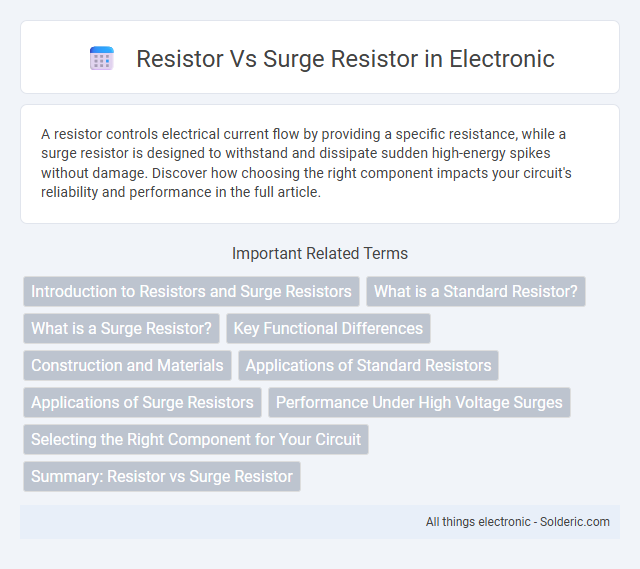A resistor controls electrical current flow by providing a specific resistance, while a surge resistor is designed to withstand and dissipate sudden high-energy spikes without damage. Discover how choosing the right component impacts your circuit's reliability and performance in the full article.
Comparison Table
| Aspect | Resistor | Surge Resistor |
|---|---|---|
| Purpose | Limits current, divides voltage in circuits. | Withstands and dissipates high energy surges and spikes. |
| Power Rating | Typically low to medium (0.125W - 5W). | High power rating (5W and above) for surge protection. |
| Construction | Standard carbon film, metal film, or wirewound. | Robust, often wirewound or metal oxide with enhanced thermal capacity. |
| Usage | General circuits, signal conditioning, voltage division. | Power supply lines, transient voltage suppression, lightning arrest. |
| Response to Surges | Can be damaged by high voltage/current spikes. | Designed to absorb and survive large transient surges. |
| Cost | Lower cost for standard applications. | Higher cost due to enhanced durability and rating. |
Introduction to Resistors and Surge Resistors
Resistors are fundamental electronic components designed to limit current flow and adjust signal levels in circuits, specified by resistance values measured in ohms. Surge resistors are specialized types engineered to withstand high transient currents caused by voltage spikes or surges, providing protection to sensitive components. Their enhanced thermal and power dissipation capabilities make surge resistors essential in power supplies, surge protection devices, and industrial electronic systems.
What is a Standard Resistor?
A standard resistor is an electronic component designed to provide a precise amount of electrical resistance in a circuit, typically measured in ohms (O). It regulates current flow, divides voltages, and protects components by dissipating electrical energy as heat under normal operating conditions. Unlike surge resistors, standard resistors are not specifically built to handle sudden high-energy spikes or transient voltage surges.
What is a Surge Resistor?
A surge resistor is a specialized type of resistor designed to withstand sudden high-voltage or high-current spikes known as surges. Unlike standard resistors, surge resistors have enhanced power ratings and durability to dissipate energy safely during transient events in electrical circuits. These components are crucial for protecting sensitive electronics from damage caused by voltage surges in power supplies or lightning strikes.
Key Functional Differences
Resistors regulate electric current by providing consistent resistance, ensuring stable voltage and current flow in circuits. Surge resistors are designed to withstand high-energy transient surges, protecting components from voltage spikes with higher power ratings and thermal tolerance. Unlike standard resistors, surge resistors maintain performance under fast, high-voltage pulses without degradation or failure.
Construction and Materials
Resistors are typically constructed using carbon film, metal oxide, or wire-wound materials designed to provide stable resistance under normal operating conditions. Surge resistors, however, incorporate robust construction using high-energy metal oxide or wirewound coatings combined with ceramic or composite substrates to withstand brief, intense voltage surges. The enhanced materials and structural design of surge resistors enable them to dissipate large transient currents without degradation, ensuring reliability in high-stress environments.
Applications of Standard Resistors
Standard resistors are widely used in electronic circuits for current limiting, voltage division, and signal conditioning to ensure stable performance and protect sensitive components. These resistors are essential in applications like power supplies, audio devices, and measurement instruments where precise resistance values help maintain circuit functionality. Your projects benefit from standard resistors' reliability in controlling current flow and maintaining voltage levels under normal operating conditions.
Applications of Surge Resistors
Surge resistors are specifically designed to withstand high voltage spikes and current surges, making them ideal for protecting sensitive electronic circuits and equipment in power supplies, automotive electronics, and industrial machinery. Unlike standard resistors, surge resistors are used in transient suppression, energy dissipation during voltage surges, and safeguarding against electrostatic discharge (ESD). Their robust construction and high pulse energy rating ensure reliable performance in applications such as lightning protection, power converters, and motor drives.
Performance Under High Voltage Surges
Resistors typically handle standard voltage levels but may fail or degrade rapidly under high voltage surges. Surge resistors are specifically designed with enhanced materials and construction to absorb and dissipate sudden high-energy spikes, offering superior performance and reliability during transient events. Your electronic circuits benefit from surge resistors by maintaining stability and preventing damage during unexpected voltage surges.
Selecting the Right Component for Your Circuit
Selecting the right resistor for your circuit involves understanding the specific role it must play: standard resistors manage current flow under normal operating conditions, while surge resistors are designed to withstand high energy spikes without damage. Surge resistors feature higher power ratings and special construction materials to absorb transient surges caused by lightning, power fluctuations, or switching events. Ensure your choice matches the circuit's voltage, current requirements, and potential surge conditions to protect sensitive components and maintain reliable performance.
Summary: Resistor vs Surge Resistor
Resistors regulate electrical current by providing a specific resistance value to control voltage flow in circuits. Surge resistors are specially designed to withstand sudden, high-energy voltage spikes without damage, offering enhanced durability compared to standard resistors. Your choice between a resistor and a surge resistor depends on the application's exposure to transient voltage surges and the need for reliable surge protection.
resistor vs surge resistor Infographic

 solderic.com
solderic.com